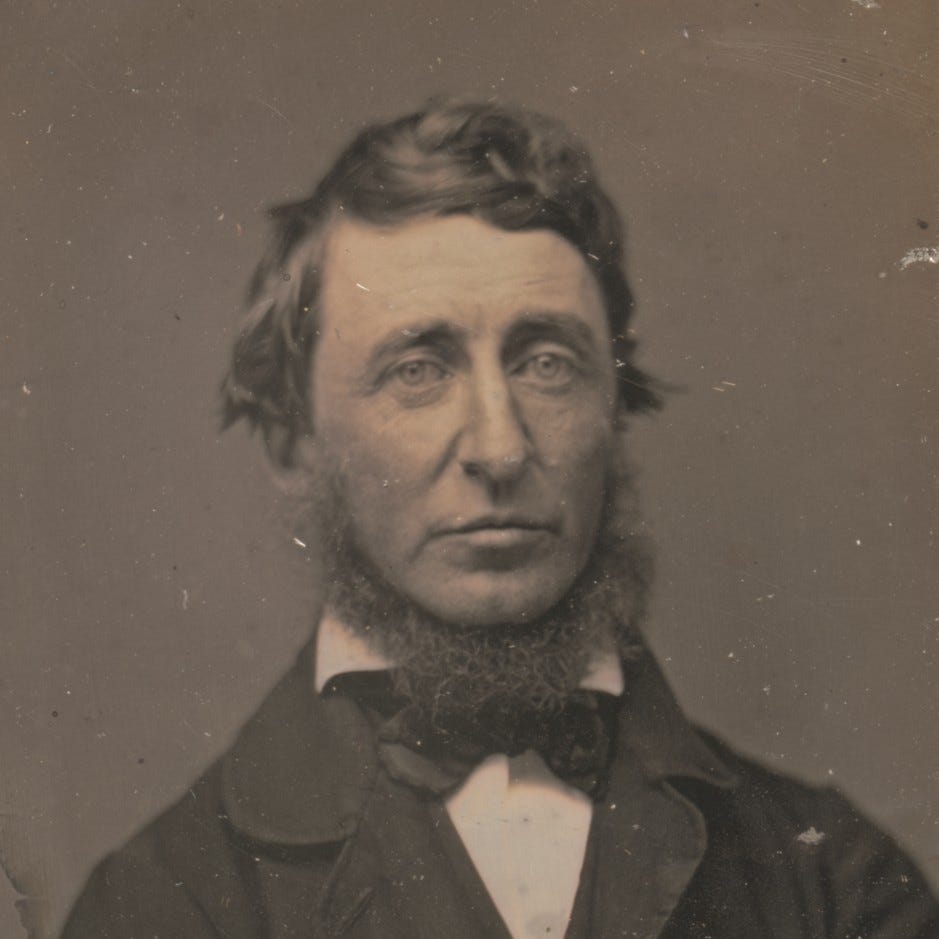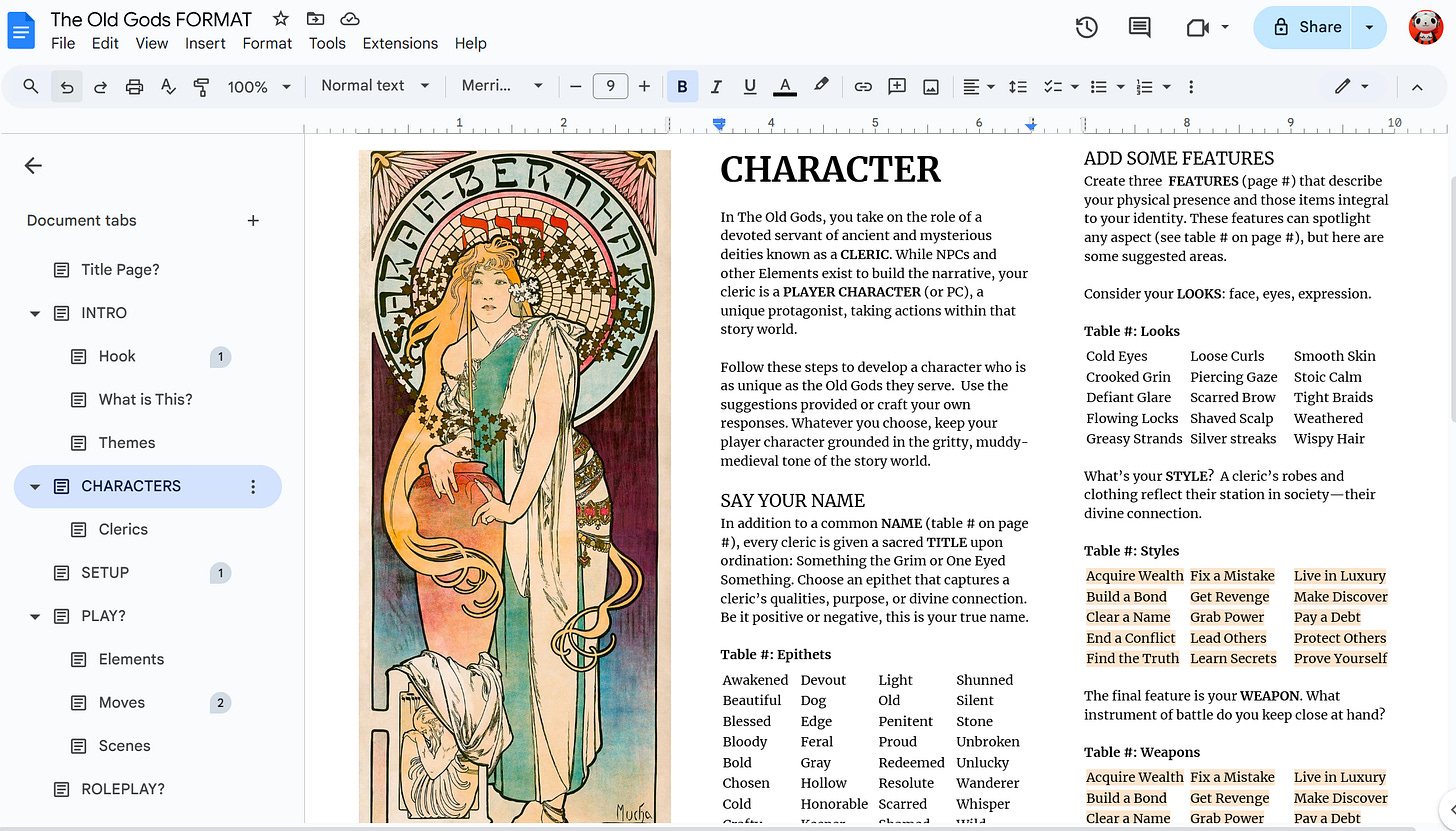Thoreau Was Right: Scope Is Key in RPG Design
Avoiding Scope Bloat is the Balm for Burnout
Let’s Explore, Create, and Grow Together!
Embark on The (Side) Quest: A journey into tabletop roleplaying games, storytelling, and beyond.
“SIMPLIFY, SIMPLIFY”
You’ve probably heard that Henry David Thoreau quote before:
Our life is frittered away by detail... simplify, simplify.
Thoreau developed this idea while living at Walden Pond, where he built his own house, grew his own food, and lived a (mostly) solitary existence for about two years. You could say he was experimenting with life. What would it be like away from modern distractions, to strip life down to the bare essentials?
“What does all this have to do with designing a roleplaying game?” you ask?
Trust me. It does.
“Simplify, simplify” applies to any project, actually—writing a novel, figure drawing, crafting a dang Substack post, or (as I have learned) designing a tabletop roleplaying game.
No. I’m not suggesting we design only “simple,” minimalist, or rules-lite games.
Thoreau’s challenge gets to the heart of what derails all my creative endeavors (and maybe yours, too):
Scope.
ORIGIN STORY TIME!
I started designing tabletop roleplaying games because I was frustrated with sci-fi titles like Starfinder and Traveller. They were too complicated for my tastes. None of them captured the fast-paced, dogfight-style action I craved. The current games ran like Star Trek. I wanted Star Wars.
I was venting about this to one of my nerd-friends when he said, “Why don’t you just design your own game?”
“Oh. Yeah. Why don’t I… ?”
I called it Jumpship and threw myself into this swirling vortex of world-building, mechanics, character stats, and dice-probability calculations. Months passed as I worked early mornings before school and late nights after the kids went to bed. One exciting idea would lead to another and another (and another).
Then one day the tickety-tack of my keyboard fell silent as I was slapped in the face with a sobering realization.
My document had ballooned to fifty pages… but Jumpship was nowhere near complete.
The game had some (possibly cool) mechanics for dogfights. Sure. It gave players the ability to create interesting interstellar characters. Ok. But the system I was creating (and the way I was writing it) required many, many more pages… a tomb the size of the Dungeons & Dragons 5e: Players Handbook.
My brain spiraled:
I can’t write a 320-page Player’s Handbook!
Where will I get the art? Wait. How will I pay for the art?
How will I even publish this thing!
That’s when Jumpship dropped out of hyper-space and slammed straight into an asteroid of pure, solid reality.
Crash and burnout.
The project had grown beyond my capacity, and to this day that unchanged fifty-page doc haunts my Google Drive.
WHAT’S THIS “SCOPE” YOU SPEAK OF?
Simply put (see what I did there?) scope refers to the boundaries of a project.
Scope = What can you realistically accomplish with the energy, resources, and time you have available?
My Jumpship experience, as it turns out, is a classic case of unclear project scope.
When I started, I had this vision of a game that captured everything I loved about sci-fi space adventures—which, apparently, is a lot. The game mutated into a kaiju-monster requiring hundreds of pages, all kinds of artwork, and maybe even a publishing strategy.
By failing to consider scope early on, I set myself up for burnout.
You can find folks writing about this term all over the internet, but I first heard the term scope (and scope bloat) from Elijah Mills. He’s a super imaginative creator and all-around good guy. We connected on Discord when he announced the launch of one of his more imaginative games, Super High Wizards Built This Castle, and I knew that we would be great friends. This was right around the time Jumpship crashed and burned in my face. His insights on scope changed my design approach. Honestly, I’m not sure if I’d still be making games without his advice.
Does that make Elijah, kind of, the Henry David Thoreau of RPGs?
Anyway, project scope is about finding the balancing between what you dream of creating and what you can handle.
Ever since Jumpship I define the scope of a project early on.
Your friend here J. Clay is always biting off waaay more than he can chew!
But, here’s what I’ve figured out so far.
SET THY GOAL
I have to start a project by defining what I want to achieve—in the simplest terms possible.
For example, I figured out exactly what I wanted to achieve with The Old Gods:
Design a tabletop roleplaying game that will emulate an organic storytelling experience (read more here: “The Challenge”).
I also set myself some publishing parameters. The Old Gods would have…
A title page with cool art
4-5 pages of content (max)
Very little (if any) interior art
That’s it.
By defining the scope of my project early on, I’m hoping to avoid the trap of endless additions.
KNOW THY LIMITS
Whatever the project, you have to choose a scope that fits you and your current situation.
I’m a teacher, a father of two young children, a husband, and… I would like to go outside every once-in-a-while.
However, I’m also driven to go above and beyond. I absolutely love challenges. I don’t want the training wheels; I just want to jump on the bike and ride!
So, knowing my limits is a difficult task. And when it comes to designing games, I’m still dialing it in.
I recently saw Substacker Anthony Lee Phillips post about his plan to write 32 novels.
And I’m rooting for the kid. Look, you have to follow this guy. If he can capture his passion for writing in his writing, I will be reading all 32 books!
His list immediately gave me anxiety… but it might be the perfect scope for Phillips. That’s the thing about scope, right? What’s manageable for one person might be overwhelming for another.
“Know thyself.”
The key to avoiding burnout, it seems, is finding what project scope works for you.
HERE WE GO AGAIN…
Scope Bloat is for real.
Even though I’m painfully aware of this concept, I caught myself sliding into scope bloat once again while designing for my recent project, The Old Gods!
It began with a vision for the character creation section. I dreamed up full-fledged PBTA-style playbooks. There would be “The Light” and “The Penitent” and “The Broken Blade.” And my brain started doing (as described by my concerned wife) its “Beautiful Mind thing.” I jumped into designing formatted sheets with names, backgrounds, traits, etc.
But as the design progressed, I found myself getting frustrated, overwhelmed. Why?
That’s when I had my Thoreau moment.
Hold up. How big do I really want this project to be?
I revisited my project scope… and discovered how far off I was. Playbooks would add another five pages to my original plan (at least)!
I needed to reign it back—time to simplify—before I got burned out. Again.
Here’s the thing: “Simplify[ing], simplify[ing]” ain’t easy, folks.
Recently, bad-ass artist Thig posted a fascinating Substack video demonstrating how he achieves a "simple" art style.
What the recording revealed to me was all the steps (and steps back) it took to create that effortless look.
Scope works the same way. Your design has to get crazy before it gets clear.
JUST SIMPLIFY
It’s easy to get bogged down by (unnecessary) complexity in any project, but I’ve learned to keep it simple.
Cut out the non-essentials.
Hone in on the basics.
Cut to the chase.
Trim the fat.
Keep it real.
Shit. I’m doing it again.
Look, even Thoreau listed “simplify” twice, for Pete’s sake! Doesn’t the repetition add complexity, Henry?
There is good news. Thoreau also said this:
The only people who ever get anyplace interesting are the people who get lost.
We will wander down paths that lead to unnecessary complexity. We will overshoot our original goal. Perhaps, though, it’s actually a good thing to start off dreaming big (like Phillips: not just one novel… but 32)?
Maybe, to understand your true goal, you have to get a little lost first?
(Here’s to finding our way back.)
Scope has become an important element in my game design process.
You start with a plan.
It Inevitably blows up.
You refine it, cut it back.
And repeat.
“Simplify, Simplify.”
This is the way. Easier said than done, but…
This is the way.
What’s the scope of your project right now? How do you avoid scope bloat?




This is a very insightful post and something I'm personally struggling with. I want realism but it has to be playable. There's always a tradeoff.